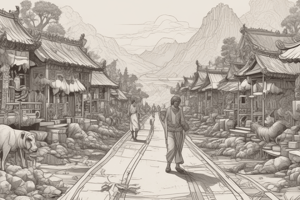Podcast
Questions and Answers
What is the primary focus of anthropology as a discipline?
What is the primary focus of anthropology as a discipline?
- Exploring human behavior and cultural distinctions (correct)
- Studying human genetics and evolution
- Analyzing political systems and government structures
- Examining societal norms and values
Which of the following best describes sociology?
Which of the following best describes sociology?
- The study of development in human genetics
- The examination of economic frameworks
- The exploration of social institutions and relationships (correct)
- The analysis of religious beliefs and practices
How is a nation-state primarily defined?
How is a nation-state primarily defined?
- Based on its historical treaties and alliances
- By its political ideology and governance style
- By its economic power and military strength
- Through its citizens sharing common language and culture (correct)
Which of the following components contributes to personal identity?
Which of the following components contributes to personal identity?
What are morals primarily based on?
What are morals primarily based on?
What is the role of ethics in personal identity?
What is the role of ethics in personal identity?
What does environmental determinism suggest about people?
What does environmental determinism suggest about people?
Who proposed the idea that each individual contains the entire information field of society in their own way?
Who proposed the idea that each individual contains the entire information field of society in their own way?
What defines the core beliefs that guide an individual's actions within a culture?
What defines the core beliefs that guide an individual's actions within a culture?
Which characteristic of culture suggests that it is not static and can change over time?
Which characteristic of culture suggests that it is not static and can change over time?
Which option represents a tangible form of cultural heritage?
Which option represents a tangible form of cultural heritage?
What process involves individuals learning and internalizing the norms and values of their society?
What process involves individuals learning and internalizing the norms and values of their society?
Which term describes the social rules that dictate acceptable behavior in a given culture?
Which term describes the social rules that dictate acceptable behavior in a given culture?
Which of the following is considered a cultural threat related to the influence of other societies?
Which of the following is considered a cultural threat related to the influence of other societies?
What is the primary difference between socialization and enculturation?
What is the primary difference between socialization and enculturation?
Which of the following best describes intangible cultural heritage?
Which of the following best describes intangible cultural heritage?
Flashcards are hidden until you start studying
Study Notes
Anthropology, Sociology, and Political Science
- Anthropology studies humanity from scientific and historical perspectives, exploring societal features that distinguish humans from other species.
- Sociology examines social institutions, structures, and relationships, analyzing how they shape culture and societal development.
- Political Science delves into politics and government, investigating power distribution, political decision-making, and the role of political institutions in society.
Nation-State and Personal Identity
- A nation-state is a sovereign entity characterized by citizens sharing a common culture, language, descent, and history, contributing to personal identity.
- Personal identity evolves throughout life, shaped by individual experiences and societal contexts.
Elements of Identity
- Morals are core beliefs that influence behavior in specific situations.
- Values are learned from childhood experiences, parental influences, and cultural surroundings.
- Ethics are societal rules that guide actions in complex situations, reflecting one's moral compass.
Cultural Concepts
- Environmental determinism posits that human behavior is shaped by geographical features.
- Culture is characterized by being learned, shared, symbolic, dynamic, adaptive, and integrated while also potentially maladaptive.
Cultural Values, Norms, and Beliefs
- Values are fundamental principles that motivate attitudes and actions, central to individual identity.
- Beliefs are personal convictions influenced by experiences, upbringing, and cultural contexts.
- Norms are societal expectations that dictate acceptable behavior within specific groups or communities.
Cultural Heritage
- Tangible cultural heritage includes physical objects that provide space for non-physical culture expressions.
- Intangible cultural heritage encompasses non-material cultural practices, vital to cultural identity.
- UNESCO recognizes both tangible and intangible forms as part of cultural heritage.
Cultural Threats
- Globalization impacts cultural identities through the spread of ideas and practices.
- Colonialism and imperialism have historically disrupted local cultures.
- Cultural appropriation raises issues of ownership and respect for cultural elements.
- Technological change can alter traditional practices and lifestyles.
- Economic pressures often challenge the sustainability of cultural heritage.
- Political and social conflicts threaten cultural cohesion and continuity.
- Environmental changes can lead to cultural displacement and loss.
- Loss of language undermines cultural transmission and identity.
Self, Socialization, and Enculturation
- The self emerges from social processes, shaped by interactions and experiences within society.
- Socialization is a lifelong process through which individuals learn and internalize cultural norms and values.
- Enculturation refers specifically to the adoption of cultural practices and norms, focusing on integrating into a particular cultural context.
Studying That Suits You
Use AI to generate personalized quizzes and flashcards to suit your learning preferences.




